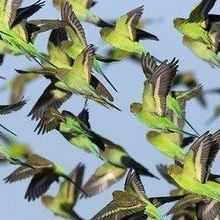Login
Subscribesocial

Manta Ray Populations Have Complex Social Structures
Catherine Offord | Nov 1, 2019 | 2 min read
Reef mantas in Indonesia exhibit social preferences and form distinct social groups.

Oxytocin Makes Time Fly
Sukanya Charuchandra | Aug 1, 2018 | 2 min read
Can people’s social skills affect their experience of time?

Image of the Day: Cuddle Buddies
Sukanya Charuchandra | Jun 1, 2018 | 1 min read
Researchers studying macaques in Morocco find that socialization improves the monkeys’ odds of surviving the winter.

John Cacioppo, a Founder of Social Neuroscience, Dies
Kerry Grens | Mar 7, 2018 | 2 min read
The University of Chicago psychology professor made fundamental contributions to understanding the neural mechanisms of social experiences.

Social Dominance Comes At a Cost
Richard Kemeny | Mar 5, 2018 | 3 min read
Dominant male mammals are particularly at risk of infection by parasites.

Are the Brains of Transgender People Different from Those of Cisgender People?
Shawna Williams | Mar 1, 2018 | 10+ min read
Research into the biological basis of gender identity is in its infancy, but clues are beginning to emerge.

Infographic: Searching for the Neural Basis of Gender
Shawna Williams | Feb 28, 2018 | 1 min read
Brain studies have yielded a mixed picture of the neural similarities and differences between people of different genders.

Video: Swimming with Virtual Swarms
Ashley Yeager | Aug 21, 2017 | 1 min read
Researchers track a fish in a virtual-reality system as it responds to projections of other fish of the same species.

Video: Researchers Control Drosphila Flight with Virtual Reality
Ashley Yeager | Aug 21, 2017 | 1 min read
Surrounded by a projection screen, a fly’s flight path is influenced by a collection of moving dots.

Virtual Reality for Freely Moving Animals
Ashley Yeager | Aug 21, 2017 | 4 min read
Experiments that place untethered fish, flies, and mice in simulated environments give clues about the animals’ social behavior.

Book Excerpt from Testosterone Rex
Cordelia Fine | Dec 31, 2016 | 4 min read
In Chapter 6, “The Hormonal Essence of the T-Rex?” author Cordelia Fine considers the biological dogma that testes, and the powerful hormones they exude, are the root of all sexual inequality.

Genes Linked to Dogs’ Sociability with People
Jef Akst | Sep 30, 2016 | 2 min read
Genetic variants on chromosome 26 appears to play a role in a dog’s tendency to turn to people for help.

Puppy Love
Jef Akst | Apr 17, 2015 | 2 min read
Dog owners bond with their four-legged friends via the same hormonal pathways through which human mothers bond with their babies.

Pleasure To Smell You
Jef Akst | Mar 4, 2015 | 2 min read
People tend to sniff their mitts after shaking hands with someone of the same sex, suggesting that the traditional greeting may transmit chemosensory signals.

Bouncing Back
Ashley P. Taylor | Feb 1, 2015 | 2 min read
In mice, a transcriptional regulator, β-catenin, activates a microRNA-processing pathway in the nucleus accumbens to promote resilience to social stress.

The Genetics of Society
Claire Asher and Seirian Sumner | Jan 1, 2015 | 10 min read
Researchers aim to unravel the molecular mechanisms by which a single genotype gives rise to diverse castes in eusocial organisms.

Pilot Study Treats Infants for Autism
Jef Akst | Sep 11, 2014 | 1 min read
A preliminary trial finds that teaching parents certain therapeutic interactions for babies showing early signs of autism may improve the infants’ future social development.

Behavior Brief
Rina Shaikh-Lesko | Mar 12, 2014 | 4 min read
A round-up of recent discoveries in behavior research

Week in Review: June 3–7
Jef Akst | Jun 7, 2013 | 4 min read
Crowdsourcing biomedical research; bird flu contagion?; zebrafish shed light on inherited muscle disorder; the economics of the Human Genome Project; the epigenetics of pair bonding
